Vedic Education for Women
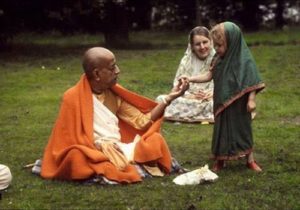 By His Holiness R.P. Bhakti Raghava Swami
By His Holiness R.P. Bhakti Raghava Swami
Date: March 5, 2020.
Discourses on Vedic traditional education covering both Gurukula and Varnasrama College inevitably beg the question: what is meant to be the education for women?
Both the ancient traditional Gurukula system of the Vedic culture and the more recent Varnasrama College system advocated by Srila Prabhupada are to train young boys (in Gurukulas) and young men (in Varnasrama Colleges) to take up their particular varna.
“In Vedic times they would train boys as brahmacaris; no sex life was allowed at all up to the age of twenty-five. Where is that education now? A brahmacari is a student who lives a life of complete celibacy and obeys the commands of his guru at the Gurukula [school of the spiritual master].” (SSR 2: Choosing a Spiritual Master)

Prabhupada: So far Gurukula is concerned, that also, I have given program. They have given the name of “girls”. We are not going to do that.Tamal Krsna: What is that?Prabhupada: Girls. Boys and girls. That is dangerous.Tamal Krsna: Gurukula.Prabhupada: In that article.Tamal Krsna: Oh, oh, oh.Prabhupada: Girls should be completely separated from the very beginning. They are very dangerous.Tamal Krsna: So we’re… I thought there were girls in Vrindavana now. They said they’re going to have the girls’ Gurukula behind the boys’ Gurukula. Gopala was talking about that.Prabhupada: No, no, no. No girls.Tamal Krsna: It should be in another city or somewhere else.Prabhupada: Yes. They should be taught how to sweep, how to stitch…Tamal Krsna: CleanPrabhupada: … clean, cook, to be faithful to the husband.Tamal Krsna: They don’t require a big school.Prabhupada: No, no. That is mistake. They should be taught how to become obedient to the husband.Tamal Krsna: Yeah, you don’t learn that at school.Prabhupada: This should be stopped, this practice of prostitution. This is a very bad system in Europe and America. The boys and girls, they are educated — co-education. From the very beginning of their life they will become prostitutes. And they encourage.Tamal Krsna: Oh, yeah.Prabhupada: They distribute pills. I have seen the boys and girls dancing together, embracing, in the school [indistinct]. That ruins the career. Both of them are ruined. That is very regrettable. Then you shall require this sterilization, pills, another big program. They are creating animal civilization, and when the animals are disturbing, they are trying to find out some other means. This is their program. First of all create animals. Then, when the animals behave like animals, then another program. Why do you create animals. Women brahmacarini, this is artificial.(Morning Conversation — April 29, 1977, Bombay)
Regarding Varnasrama College
Satsvarupa: Srila Prabhupada, is this school for women also, or just for men?Prabhupada: For men. Women should automatically learn how to cook, how to cleanse home.Satsvarupa: So they don’t attend Varnasrama College.Prabhupada: No, no. Varnasrama College especially meant for the brahmana, ksatriya, and vaisya. Those who are not fit for education, they are sudras. That’s all. Or those who are reluctant to take education — sudra must. That’s all. They should assist higher class.(Morning Walk, “Varnasrama College” — March 14, 1974, Vrindavana)
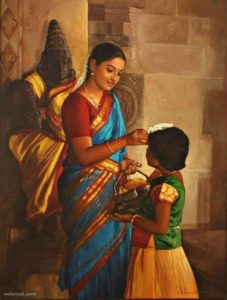 Varna is what determines ones education (formal or non-formal) which in turn determines ones occupation among the four varnas as well as ones future ashram. Therefore, Srila Prabhupada emphasised “First is Varna”.
Varna is what determines ones education (formal or non-formal) which in turn determines ones occupation among the four varnas as well as ones future ashram. Therefore, Srila Prabhupada emphasised “First is Varna”.Traditionally, the Varna was assessed and fixed (through astrology, family hierarchy, observation and psychological testing) by the local learned Brahmanas of the village before the young boy reached the age of 15 (see “Sajjana Toshani” by Srila Bhaktivinoda Thakura and Essay on “Gita Nagari” by Srila Prabhupada). There is no mention of fixing the varna for young girls.
Traditionally, at the time of her marriage, a young girl inherits and accepts the same varna of her husband as she is meant to serve and be cared for by a husband who is not fallen.
“To render service to the husband, to be always favorably disposed toward the husband, to be equally well disposed toward the husband’s relatives and friends, and to follow the vows of the husband — these are the four principles to be followed by women described as chaste.” (SB 7.11.25)
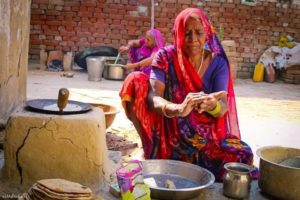
“A chaste woman must dress nicely and decorate herself with golden ornaments for the pleasure of her husband. Always wearing clean and attractive garments, she should sweep and clean the household with water and liquids so that the entire house is always pure and clean. She should collect the household paraphernalia and keep the house always aromatic with incense and flowers and must be ready to execute the desires of the husband. Being modest and truthful, controlling her senses, and speaking in sweet words, a chaste woman should engage in the service of her husband with love, according to time and circumstances. (SB 7.11.26-27)
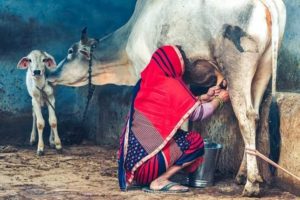
“A chaste woman should not be greedy, but satisfied in all circumstances. She must be very expert in handling household affairs and should be fully conversant with religious principles. She should speak pleasingly and truthfully and should be very careful and always clean and pure. Thus, a chaste woman should engage with affection in the service of a husband who is not fallen.” (SB 7.11.28)
In an agrarian based society (the Vedic Culture advocates an agrarian/village based lifestyle) it is more clearly seen, understood and accepted that varna selection is for males, not for females.
Formal education (Gurukula) prepares young men to be “independent” in their future occupation as Brahmanas, Kshatriyas or Vaisyas. They thus become the natural public leaders of society. Since women are not meant to be independent nor public figures, such formal education is not prescribed for them.
“So women should be trained up to be very faithful and chaste. Then the life will be very happy. That is the only education for women.” (Room Conversation, July 13, 1975, Philadelphia)
“Therefore I am instructing our GBCs that ‘Let our little girls be educated to become faithful and chaste. That is their qualification. No education required.” (SB 6.1.3, July 16, 1975, San Francisco)
Non-formal education prepares young men to be “dependent” in their future occupation as sudras or those who serve under or work for the three natural leaders in society (namely the Brahmanas, the Kshatriyas and the Vaisyas). Such occupations are manual in nature and are mostly performed in public.
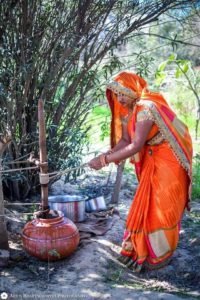 Similarly, non-formal education for young girls and young ladies prepares them to be “dependent” in their natural biological and psychological role of being ideal mothers and ideal house wives, cared for by and faithfully serving their husband.
Similarly, non-formal education for young girls and young ladies prepares them to be “dependent” in their natural biological and psychological role of being ideal mothers and ideal house wives, cared for by and faithfully serving their husband. The place of women is traditionally inside the home as opposed to outside or in public. This is referred to in sastra as “stri-dharma”as elaborated by one of the foremost authorities on Dharma, Grandfather Bhismadeva in the Santi Parva of the Mahabharata.
Non-formal education for women centers on the 64 Arts and Sciences outlined in the various Dharma Sastras. Such training and education was generally given at home by mothers and other female relatives.
Shyness and chastity are meant to be the two foremost and essential qualities for all women, both of which become compromised when women are allowed to easily mix with men, work outside in public and thus deviate from their prescribed natural role as wives and mothers.
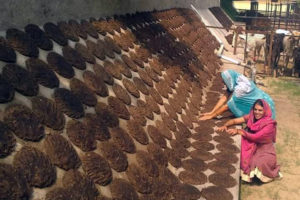
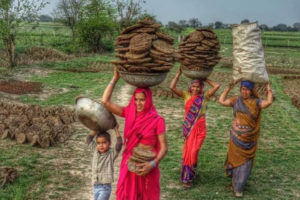
Until and unless we accept and return to the Vedic social equity advocated in the sastras, Daiva Varnasrama Dharma, which, to emphasize its importance, is based on an agrarian culture and lifestyle, we will be allured to and/or be compelled by the false, artificial, unnatural and highly destructive modern system that promotes non-traditional occupations resulting in the undue mixing of men and women driven by a false sense of equality and independence.
When women become unprotected and independent, varna sankara becomes the social norm. Varna sankara is that social condition whereby there is a total breakdown of natural interdependency between men, women and gender differentiation as upheld and promulgated in the Vedic Culture and as a result a false sense of social equity prevails.
“A woman cannot be happy if she is independent. That is a fact. In Western countries we have seen many women very unhappy simply for the sake of independence. That independence is not recommended by the Vedic civilization or by the Varnasrama Dharma.” (TLK 5, 5, Purport)
Non-formal education for men and women is largely based on acquisition of skills or apprenticeship by association, through seeing, hearing and doing, in keeping with the prescribed duties and responsibilities of both gender.
The modern artificial urban lifestyle, that is infiltrating more and more the villages as well, is based on non-traditional occupations for both men and women creating what sastra describes as ugra karma, translated by Srila Prabhupada as “ferocious activities”, largely centered on mutual exploitation, pride, prejudice and competition for gross and subtle sense gratification. Such a system, being artificial and against both our spiritual and material natures or sva dharma, is not sustainable and therefore doomed to collapse.
Both Vedic training and Vedic education are thus of paramount importance for men and women who wish to regain their original spiritual and material sva dharma.
Such training and education must be given separately for men and women as co-education is not supported in the Vedic Culture and this norm should also be followed within ISKCON.
The closer we come to the prescribed Vedic scientific social structure within Daiva Varnasrama Dharma, the established norm in the Vedic Culture, the healthier individuals and society will develop.
The more we distant ourselves from the prescribed Vedic norm, the more imbalanced and impoverished individuals and society will become.
The choice is ours to make and time is running out.
Nice Article Maharaj,
Thank you so much for guiding us in right path as Prabhupad desires
Hare Krishna
Krishna is an equal opportunity employer!
Equal opportunity to serve him. Yes !!
Not equal service though. He need variety and that why he created varigatedness. Not even two men of same age are equal. They have their own individuality (Bhagavad Gita 2nd chapter)
Krishna – bhakti, being transcendental / absolute is not subject to discrimination. Krishna – bhakti from a bird is equal to that of Krishna – bhakti from a demi god.
Krishna bhakti, a transcendental activity, is not subject to discrimination.
But this does not mean that a bird becomes a trucker.